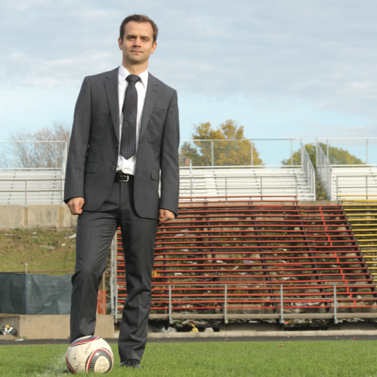Teamwork (at Work) and the Beautiful Game

Matthias Spitzmuller has long been interested in how to motivate teams and identify factors that drive a team’s success. “As a soccer player, I've always found it fascinating that a collection of individuals, no matter how good separately, rarely defeats a team that plays as a cohesive unit,” he says. “There's a synergy, a little something extra that teams can capitalize on if everybody is on the same page on the field.”
In soccer, the players’ roles are distinct: a central defender’s role is clearly differentiated from that of a right winger, for example. Without these very specialized roles, a team would cease to function, Matthias says. To be successful, teams need a collection of individuals each willing to assume one very specialized role. “However, conflict can arise when too many players try to be the leader,” he cautions. “Instead of doing what is necessary for the good of the team, players may balk at taking on a role if it doesn’t put them in the spotlight, even if that role is crucial for the team’s success."
This is where the issue of goal-setting comes into play. From personal mantras to grand vision statements, individuals and teams search for motivational techniques to give them an edge in the workplace. But for all the research and management ideas on the subject, there is still a fuzzy understanding of how individual and team motivations differ and how team motivation works in dynamic, real-life work situations.
“In our papers, we make the case that what we know about the motivation of individuals will not necessarily generalize to teams,” says Matthias in summarizing the results of the research he’s undertaken with Guihyun Park of Singapore Management University and Richard P. DeShon of Michigan State University. Their study was recently published in the Journal of Management, a prestigious academic publication.
The researchers focused on three types of goals: “specific learning” goals, such as acquiring new skills; general “do your best” learning goals; and “specific performance” goals. Previous research had shed light on when each type of goal is most effective at the individual level; for example, learning goals should be set when tasks are complex and skill is low. Surprisingly, the researchers found that this might not be the case when looking to optimize team effectiveness through goal-setting.
The researchers found that our knowledge of how to best motivate individuals does not, in fact, hold true for the motivation of teams.
For their study, Matthias and his colleagues recruited 320 undergraduate students and divided them into four-person teams. Each team participated in a command- and-control computer simulation in which they had to complete certain tasks, which allowed the researchers to manipulate the type of goal set for the team as well as the complexity of the task itself. Team coordination, individual motivation, and team performance were measured to identify the impact of goal-setting in teams.
The researchers found that our knowledge of how to best motivate individuals does not, in fact, hold true for the motivation of teams. In particular, they found that specific learning goals were not nearly as effective at motivating teams as were general “do your best” learning goals and very specific performance goals. Moreover, they found that the mechanism leading to the disparity in performance was the level of team coordination. The “do your best” approach allowed team members to better work together and support one another as they tackled a complex challenge, whereas specific learning goals actually hindered team coordination and performance, particularly as the task became increasingly complex. Why was this the case? Because team members were focused on their individual learning goals, not on overall team performance.
The availability of teammates with whom one can exchange information and engage in mutual support enables teams to deal more readily with complexities than can individuals working alone, the researchers note in Organizational Behavior and Human Decision Processes, a noted academic journal.
This finding has significant implications for managers and teams as they establish goals for tasks. Management practices do not work on the basis of a one-size-fits-all approach; managers must adapt their goal-setting practices when motivating a team, rather than an individual, to successfully perform a complex task. As the researchers point out, “Managers should not assume that the same types of goals that work effectively with individuals will also work effectively with teams.”
Matthias, ever the soccer enthusiast, adds, “That’s as true for business organizations as it is for soccer clubs."
This feature summarizes two articles about Matthias Spitzmuller’s research that appeared originally on Smith Business Insight, the platform of choice for summaries of leading-edge research from QSB faculty and renowned thought leaders. New content is added regularly and includes incisive articles, video interviews, live and on-demand webinars and white papers that cover a multitude of business topics.
